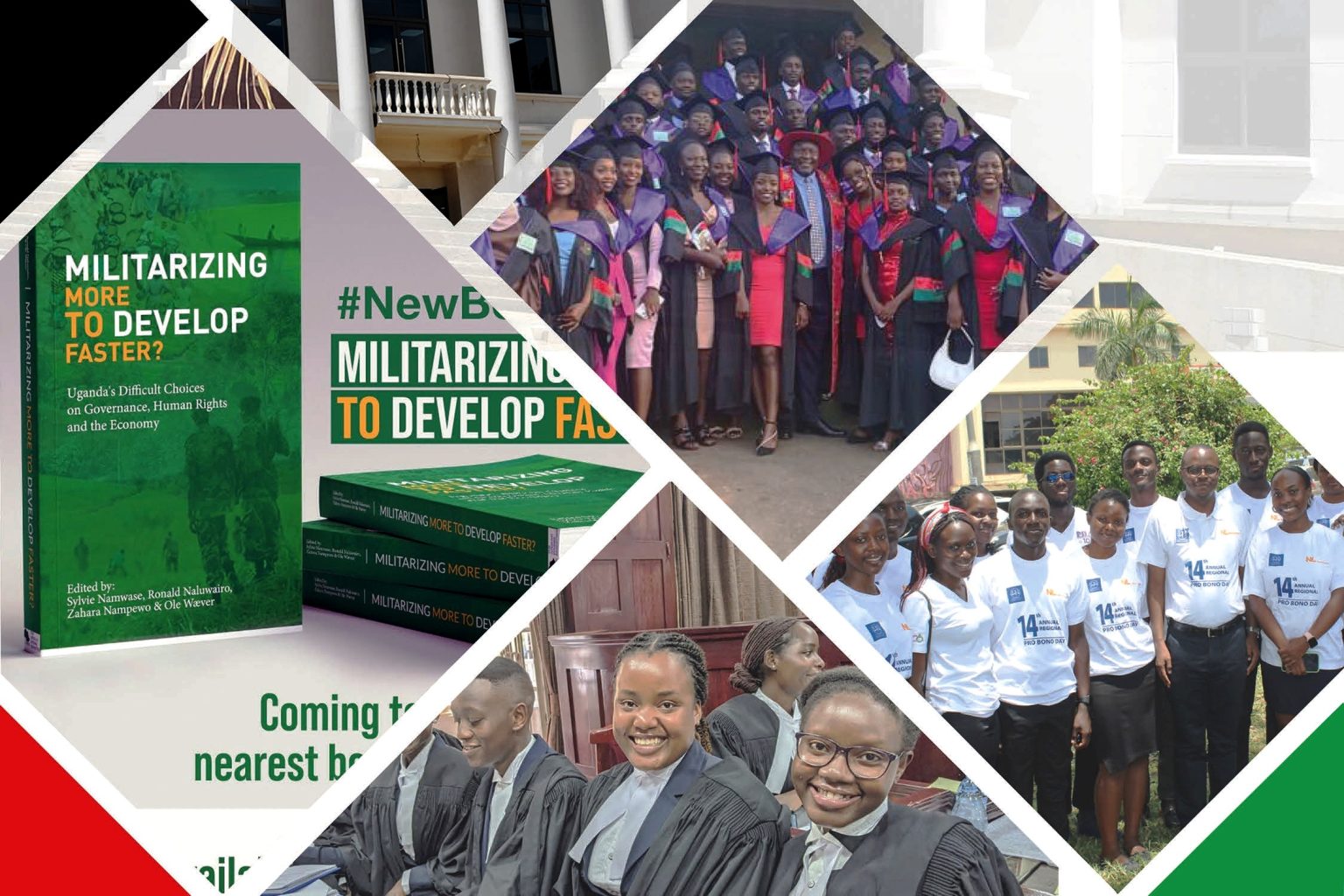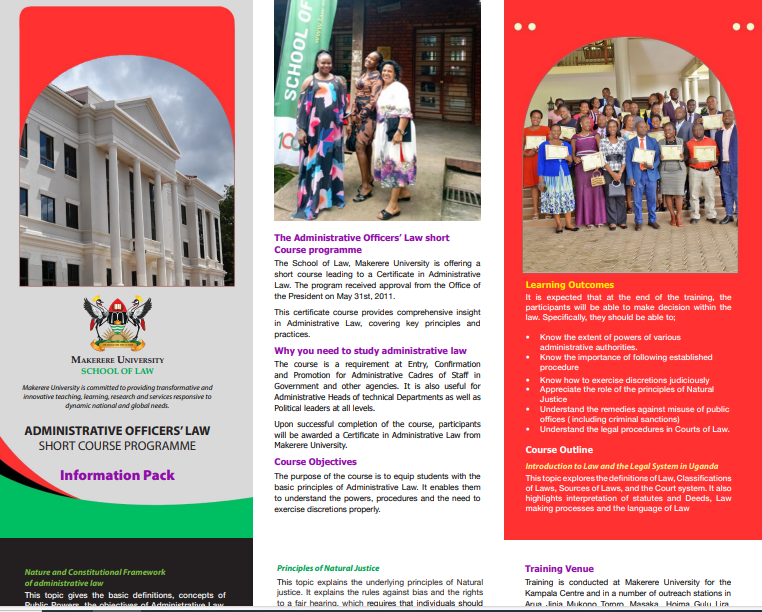PILAC Celebrates Five Years
The Public Interest law Clinic in the School of Law Makerere University celebrated five years of existence with a theme ‘ Beyond the Ivory Tower: Legal Education in the 21st Century”.The celebrations come along with a five year review of the program which has highlighted a number of achievements.
Established in 2012 as the pioneer legal aid Clinic in Universities in Uganda, PILAC boasts of a number of milestones, a testimony of which has been made in the review of the program and by partners and stakeholders.Notable among these is the fact that to date, with its vision of building a cadre of lawyers with specialist clinical legal education training, PILAC boasts of a total of Four Hundred Ninety (497) Alumni, Eleven (11) of whom have acquired Master of Laws (LL.M) 5 of which are from Harvard University, over 50 with a diploma in Legal practice and with 75% employment rate.

As some of the stakeholders observed about the program, PILAC’s focus on Career development for students has helped in contributing to a pool of professional lawyers that have a heart for social justice’an observation by Patrick Tumwine from Human Rights Network (HURINET).
‘PILAC has emerged to be a center for Public interest litigation in Uganda, targeting the common person’s legal needs that are not addressed through mainstream litigation’ notes Christine Birabwa from Justice centres Uganda.
The President Uganda Law Society Mr. Francis Gimara in his comment about PILAC says; “I commend PILAC for changing the narrative of lawyers to include public interest lawyering which had been missing in the profession.”
“PILAC has been able to build a critical mass of student (young Lawyers) who care about social justice that go out there to help communities’ observes SalimaNamusobya from the Initiative for Social Economic Rights (ISER).
Events to mark the five years of PILAC included legal aid awareness sessions organized by the legal aid unit at the halls of residence on the 30th of August 2017. There was also a public lecture on the same day at the School of Law gardens. The panelists included Dr. Pamela Tibihikirra Kalyegira, Director quality assurance and accreditation at the national Council for Higher Education, Dr. Christopher Mbazira the Principal School of Law and Coordinator PILAC, MS. Godiva Akullo, one of the PILAC beneficiaries working with Chapter IV Uganda as well as the Dean School of Law Uganda Christian University.

Dr. Christopher Mbazira in his welcoming remarks said PILAC started five years ago as “a guinea pig” and that to date, the achievements realized are slowly being emulated in the rest of the programs at the School of Law. He noted that despite the tendency to have competition amongLaw Schools in the country, PILAC is promoting a culture of working mutually with other departments in the Law School in Makerere University, as well as Law Schools in other Universities in Uganda and in the east African Region.
He highlighted some of the tangible achievements realized in the last five years that included the establishment of the East African Network of University based Law Clinics (EAUNILAC) whose secretariat is hosted by the School of Law under PILAC. This, he , bring together all Law Schools operating or intending to start Law clinics with the intention of sharing experiences, expertise, skills and academic literature and research in order to promote the good practices realized.
Dr. Mbazira noted that as student join law schools they have varied expectations and that what they eventually go through determines who they will eventually become and that this is determined by what the Universities want visavis their owndesires.
While seeking to appreciate the situation of teaching and learning law, the PILAC coordinator pondered as to who sets the agenda of legal education citing the fact that whereas most law schools want autonomy, the bar associations want to control what is taught in legal schools . This in essence, he said, clearly indicates that most of the players want to pursue their different agenda which unfortunately they never meet to reconcile their missions as stakeholders.
He said the unfortunate bit of it all is that the different players have set a standard as to what they deem to be the‘Ideal lawyer’ butobserved that the public is missed out and yet they are representative of the needs of society. He said some stakeholders look at an ideal lawyer as one who adheres to the dress code, or one who is well schooled and has all the legal issues at their figure tips hence being caged, or one that has knowledge and skills to address the needs of the corporate clients or one that adheres to the standards set by the regulatory bodies such as the Uganda Law Society, the society is missed out.
He stressed the need to have serious considerations on the needs of society whichunfortunately, is contrary to the present training of law students that focuses on grooming commercial legal practitioners.
While giving the justification for its work in the context of the current trend in teaching Law, Dr. Mbazirasaid PILAC works towards producing lawyers that can serve the justice needs of the public. He noted that despite the increase in the number of students in the Law School in Makerere and other Universities, there is a remarkable decrease in the number of practicing lawyers, which he attributed to a feeling that lawyers work in Kampala, drive big vehicles and sit in fancy offices.He cited the example of Bundibugyo where before the intervention of PILAC, there was no lawyer, adding that it is the intention of PILAC to produce lawyers that can serve such underserved communities.
The Key note speaker at the five year commemorative public lecture Dr. Pamela TibihikirraKalyegira, while congratulating PILAC for the five year achievements noted that the impact of PILAC’s work has been felt in the advocacy of social justice for various marginalized groups in the society.
While speaking in agreement with the theme for the five year celebrations, she noted that training lawyers in the 21st Century must take the form of a practical approach rooted in the experiences of real life or life beyond the classroom.
In her reminiscence about her days as a law student over twenty years back, Dr. Kalyegira noted that the traditional way of teaching made them think like lawyers, through the lecture and case methods of training, which she said,were steeped in the traditions of the law, which made students think like lawyers and ultimately ended up with cognitive knowledge of the law but without the benefit of seeing the law in action upfront during their training’
“Law school was to be strictly undertaken as a purely academic enterprise with no room for practical indulgencies in building lawyering skills. The effect of this type of training in a vacuum was to create ‘ivory tower’ lawyers who were not adequately equipped to pursue the task of advocacy for social justice or public interest lawyering’ she said.
In relation to the changing realities of today, she gladly noted the changing trend where some law schools have established clinical legal education, moot court competitions and various community law programmes which provide an opportunity for students to observe and apply the law in practice in a variety of activities. Where well structured, these activities do equip law students with a professional identity she added.
While giving her experiences as an Alumni of PILAC, Ms. AkulloGodiva expressed appreciation for the experiential training under the Clinical Legal Education program in the School of Law that was promoted by PILAC. As one of the first twelve pioneer students in PILAC, she noted that the training they received was rooted in the legal realities of Uganda and was a hands on encounter which prepared her for her career path, making her current work more relevant.
Ms. Godiva questioned the relevance of the courts at the present time noting the delays, the backlogs and the long processes involved in litigation processes as well as the inability by the vast majority of the members of the community in accessinglegal services. She said the ideal lawyer should be person who can address the real needs of the society, which skills she acquired while undergoing the practical exposures and hands on training in PILAC.
Other discussants in the plenary called for a need to modernize the traditional justice system, to build it serve the majority of the people. It was indicated that the ideal lawyer and legal system is that which is alive to the aspirations of the existing generationhence applauding PILAC for the effort towards realizing this dream.
The five year celebrations were crowned by a Gala where special recognition was made to students with outstanding performance in the various components of PILAC namely Clinical Legal Education (CLE), and the Community Law program and mobile Clinic (CLAPMOC).



